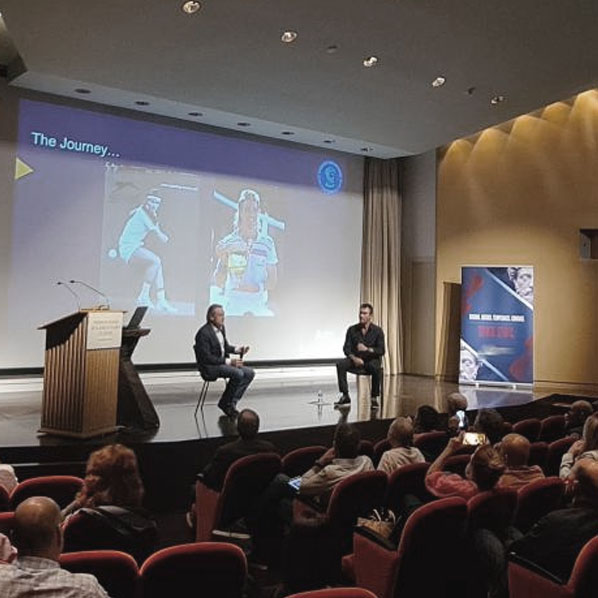-
About Us
-
Library
-
What We Do
-
Latest
- Shop
We suffer more in imagination than in reality – Explained
April 22

In his thirteenth letter, ‘On groundless fears’, Seneca wrote:
‘There are more things … likely to frighten us than there are to crush us; we suffer more often in imagination than in reality.’
The anxiety that results from our premeditation of negative events is something that Seneca tried to demystify, and perhaps reconcile with the nature of our mind.
The Stoics had long recognised that our imagination had ramifications throughout our psyche. It could impact our wellbeing, our actions, and our perception of the world and of ourselves. It could skew it in such a way that it would lead us to self-deception. They saw no benefit to complaining about things outside of our control and in fact warned against the potential dangers of allowing our imagination to run wild. They also saw anxiety as a by-product of this type of thinking, to be transformed by our own will, inner strength, and rationality.
But how do facts change into interpretations? What are the effects of this change on the individual, and the society in which they participate?
We often want to predict what the consequences of our actions will be. We can sometimes overthink possibilities within our future and devise scenarios in the hope they will allow us to cope with whatever life will throw at us. We overplay mistakes of the past in our minds, admonishing ourselves from, say, not having acted within the realm of virtuous character that we aspire to live by. We can ruminate on our mistakes over and over, fearing their imprint on our moral character rather than learning not to make them again and moving on.
Evaluating our actions against our values can be a good thing – a motivator for self-improvement, and a type of introspection that would be validated by the Stoics. The issue arises when we diverge from core introspection viewed from a Stoic perspective, towards an anxiety-inducing mental ‘replay’ of what has gone, or could go wrong.
As Seneca highlighted:
‘We are in the habit of exaggerating, or imagining, or anticipating, sorrow.’
In doing so, we put ourselves in a mental disposition which is incommensurate with the situation we happen to be in truly. We lose track of the present, and we embellish the future with our fears and insecurities. Oftentimes, our greatest inner turmoil is not an ailment of actuality, but an unconscious manifestation of our perceived shortcomings.
This leads to repercussions on both the individual, and on society at large. The immediate consequence of the gap between perception and reality is that on the individual, as briefly described above. That is the largely self-inflicted, but nevertheless perturbing, anguish of the mind.
Another, more recently observed result, is that of a tendency towards individualistic thinking – by worrying so much about our own future and placing ourselves as the epicentre of all that primarily matters, our pursuits become more selfish, driven by our hope of overcoming or compensating for our worries. This in itself can be hard, and it’s not all on us - it might be also a sign of our times: in a time where globalisation and technological development have fostered a new array of options in all aspects of our lives, we tend to exacerbate our worries not only because we are the protagonists of our stories, but also as we find ourselves asked more and more to choose. The freedom that we have also demands a responsibility of us, that of making the right choices. Then the possibility of failure rests solely on us, a point developed in Kevin Walker’s work, ‘Reading the Stoic with Millennials’ (2019):
“When we are fiercely independent and self-sufficient, our disappointments loom large because we have nothing else to focus on.”
This leads to a mutually reinforcing vicious cycle of loneliness and comparison with others. Within an environment than relies on and encourages individualism, it comes as no surprise that self-induced anxiety about our own, individual futures can occur.
The environment that social media platforms foster is also one where we might be put in a position where we constantly compare ourselves to others, and form an expectation of ourselves based on the images we see, which sometimes may contribute to a distorted representation of the world.
Given these parameters (i.e. an incorrect appraisal of the situation, a disproportionate response, myriad choices, loneliness, unrealistic comparisons and unhelpful environments), anxiety is easy to develop as we decide how to best use our time, and how to position ourselves in society.
Again, Seneca writes:
“[H]ence comes grief and melancholy and the thousand fluctuations of an uncertain mind, held in suspense by early hopes and then reduced to sadness once they fail to materialise.” The impact on society is felt across multiple levels. I divide these into three categories: skewed role, skewed interactions, and a skewed environment. Let’s look at them one by one:
1.ROLE: Firstly, the role that one plays within community becomes more and more centered towards the self, as our imagination lets us ruminate over our individual circumstances. The desire to act in the interest of the group is simultaneously diminished, diverting our efforts and endeavours from that of caring for others to caring more for our individual ambitions. Our role in society takes as reference not our roles relative to others (such as parents, children, siblings of others) but our inner motivations – which in these cases can be partly fuelled by imagined worries. An easy example is prioritising a promotion over immediate family needs, overwhelmed by the perceived need to advance quickly.
2.INTERACTIONS
Vivid stories that we tell ourselves about our place in the world do not only affect our role in absolute terms. It is not just the choices we make, the lives we lead, that are driven by our inner narratives. Our interactions with others are also ‘skewed’ by the vision of ourselves and of others we have.
One example is evidenced again by Seneca, who tells his friend Lucilius later in the letter that perhaps the most foolish fears we have are generated by mere rumours. He explains this as follows: while truths have their ‘own definite boundaries’, meaning that we know what we are facing and we can prepare accordingly for any realities we encounter, rumours ‘have a strange effect, leading us to react like an army that retreats in panic at the sight of a dust cloud over the horizon, which was, however, caused by nothing but a herd of cattle.’
The emotions provoked by rumours, thus, are similar to those evoked by excessive worrying, or other things we often imagine which may be loosely founded, are vague in nature, and therefore have no boundaries in the impact they can have on our mind.
These generated emotions can lead to changes in behaviour which may not be right or virtuous, but rather imprinted by anguish.
- SOCIAL ENVIRONMENT
By letting our fears rule us, we distance ourselves from what comes naturally to us, be it as individuals or with respect to others. We cannot live in accordance with nature, with who we are, and with virtue towards others when we are crippled in our actions and our thoughts by anxious imagination.
Now… the above is not a green light to live in denial – we cannot just ignore cues given by others or arising from our own self-awareness that there might be things we need to be addressed. Living in your imagination is dangerous, but so is ignoring surroundings. If you have indeed done something morally misaligned with your values, the solution is, again, not letting your anxiety roam freely, but taking reasonable steps to right your wrongs.
For those instances where imagination really is the culprit for our suffering, there are a few ways in which Stoic thinking can help:
a. Understanding we are the masters of our thoughts
By realising we are in control of our thoughts and emotions, we can begin to think beyond ourselves. By living life less fearfully of what could go wrong, we focus more on doing good, and not on trying to pre-empt all mishaps that might arise along the way. This understanding shifts the narrative away from the individual, and towards communities. \r
b.\tThe view from above
The view from above might also help in distancing the individual from his ‘self’ and serve as a reminder that in the grand scheme of things, some of the worries we spend time fretting about are only as big as we make them to be.\r
c.\tAmor fati According to Seneca, true suffering can only ever arise from ‘Fortune’, as our nature is determined by forces greater than ourselves. Our trying to pre-empt it or process it before it’s even started can only be a futile exercise, as we don’t choose if and how suffering is bestowed upon us.
In his 78th letter to Lucilius, Seneca writes:\
“You will not die because you are sick, but because you are alive […] That end still awaits you when you have been cured”
This shows that at the end of the day, the things that happen to us throughout our lives won’t change our fate or outcome, only the quality of life while we are still alive, again putting in perspective the sort of things we worry about and the frequency at which we do.
d.\tNegative visualisation
This is a process by which we imagine negative events so as to prepare ahead of them, and form a rational view on what an appropriate and actionable, rather than emotional, response would be if they were to materialise. The aim is not to imagine the worst possible scenarios for the sake of it, but rather to use our imagination as a preparing tool, one that permits us to see beyond immediate emotions or ‘first impressions’ as Stoics call them, and assess events for what they really are.
This is, in essence, what Marcus Aurelius advised in his ‘Meditations’, where he recommended that we start each day by premeditating future evils, and what Seneca meant in his letters where he wrote:
“He robs present ills of their power who has perceived their coming beforehand.”
And if all this is too abstract, here are the four Rs shared by a fellow Stoic enthusiast, @DhruvMakwana, which might help put the above into practice:
- Remember: anxiety is counter-productive to any situation, mistake or not
- Reduce: What about this situation is within my control?
- Revise: Challenge the judgements that lead to anxiety – where do they come from? How sure are you that they are they right? How could you be wrong?
- Reframe: is there any opportunity for virtuous actions here? Are there any positives that you can be grateful for, the absence of which would have made the situation a lot worse?
Distinguishing between rational and emotive thinking here is crucial. We should acknowledge that something negative may happen which could result in our suffering, but the precursive emotional responses we may associate need not follow.
Imagination can therefore either be a channel for self-improvement and mental strength, or a medium facilitating inner suffering. What we decide to do with it, in Stoic fashion, is our choice.

